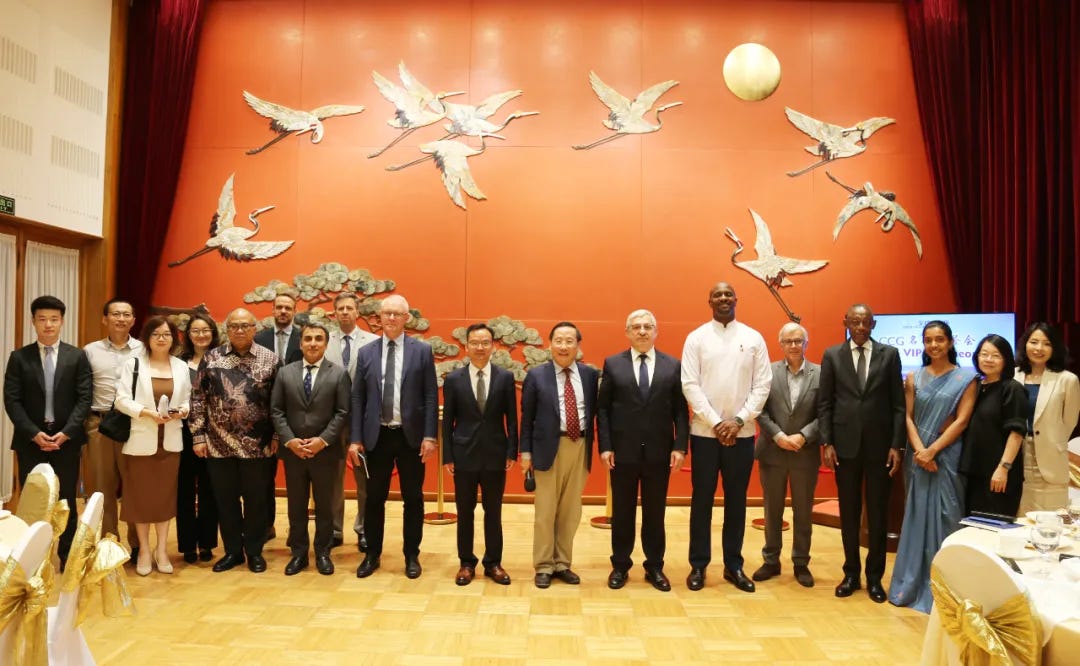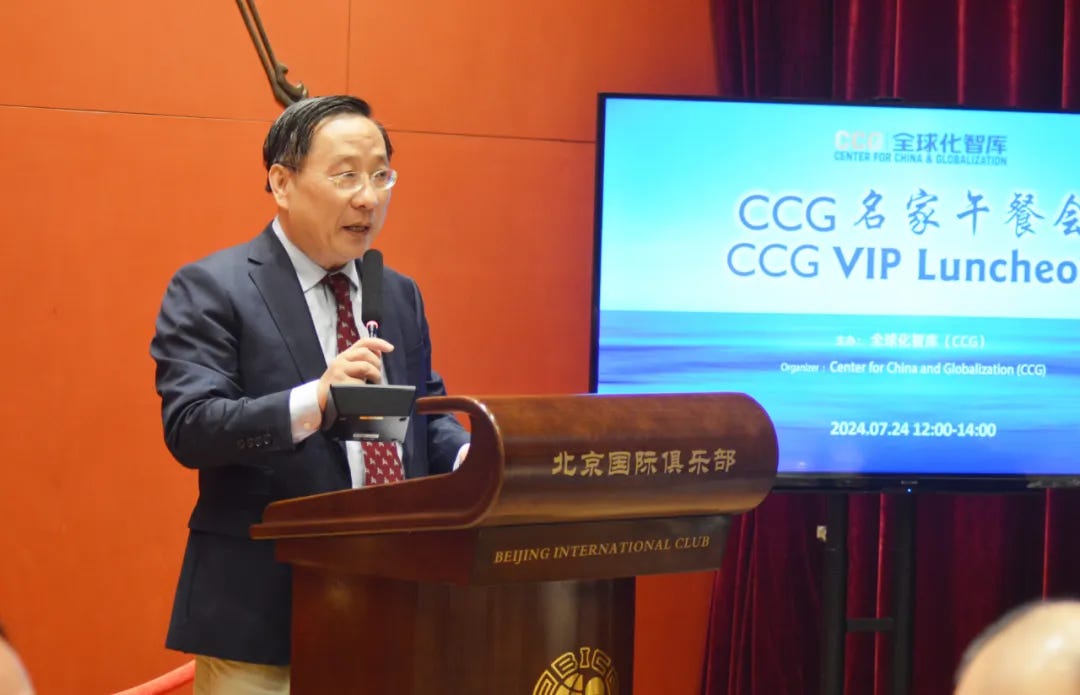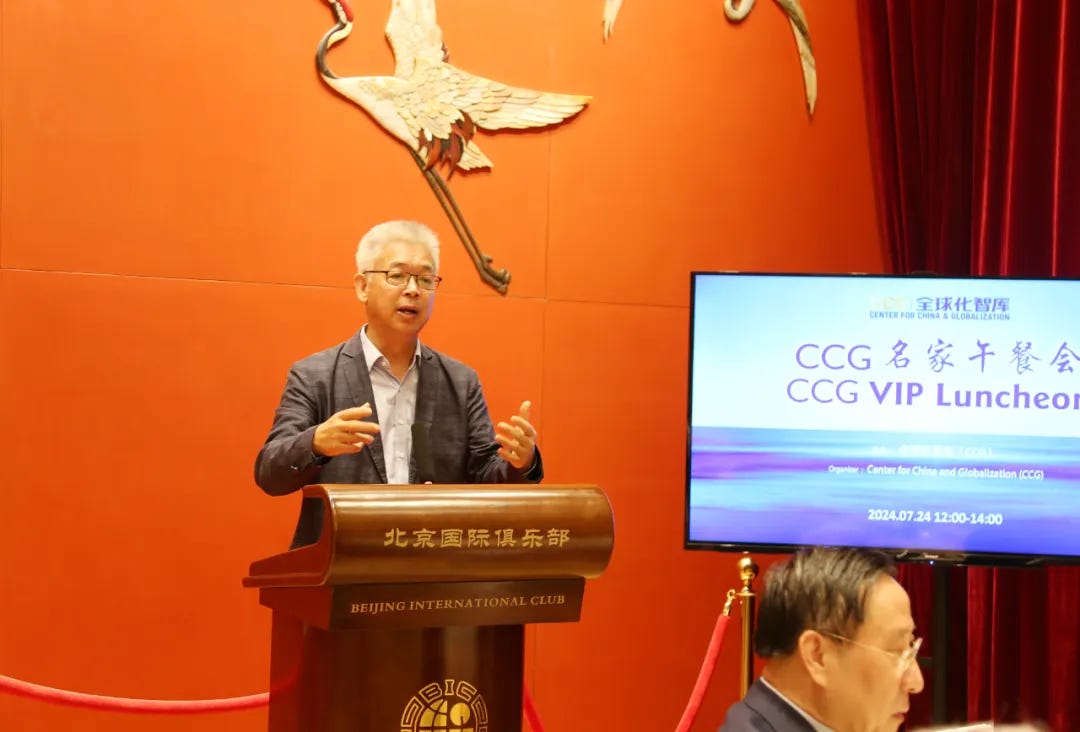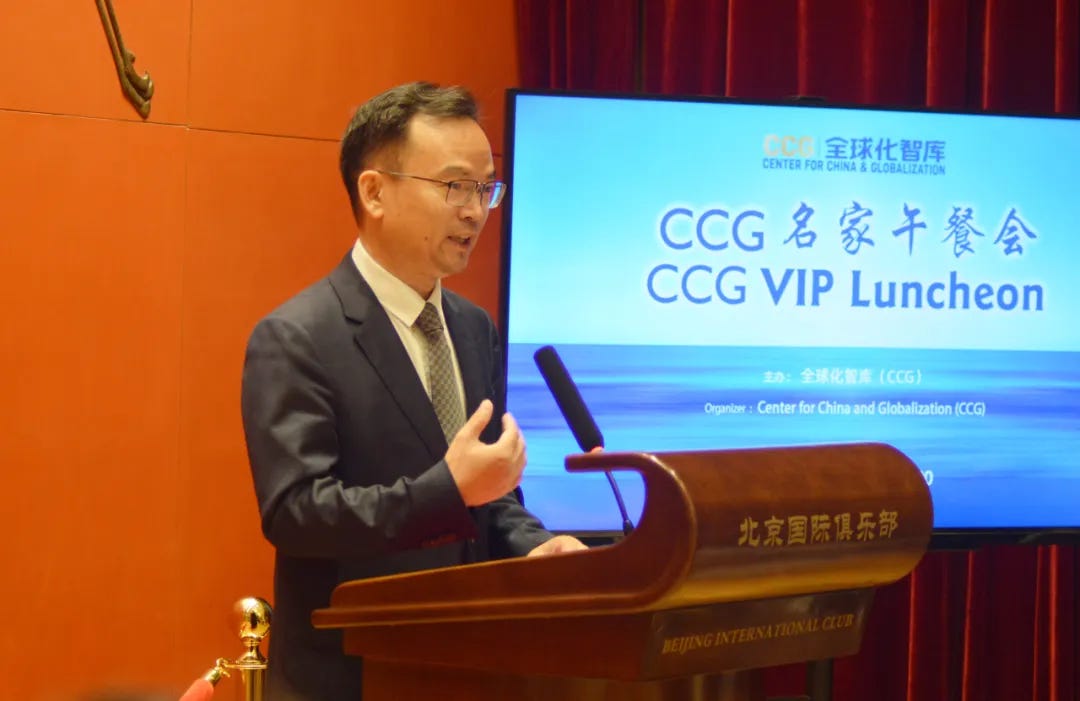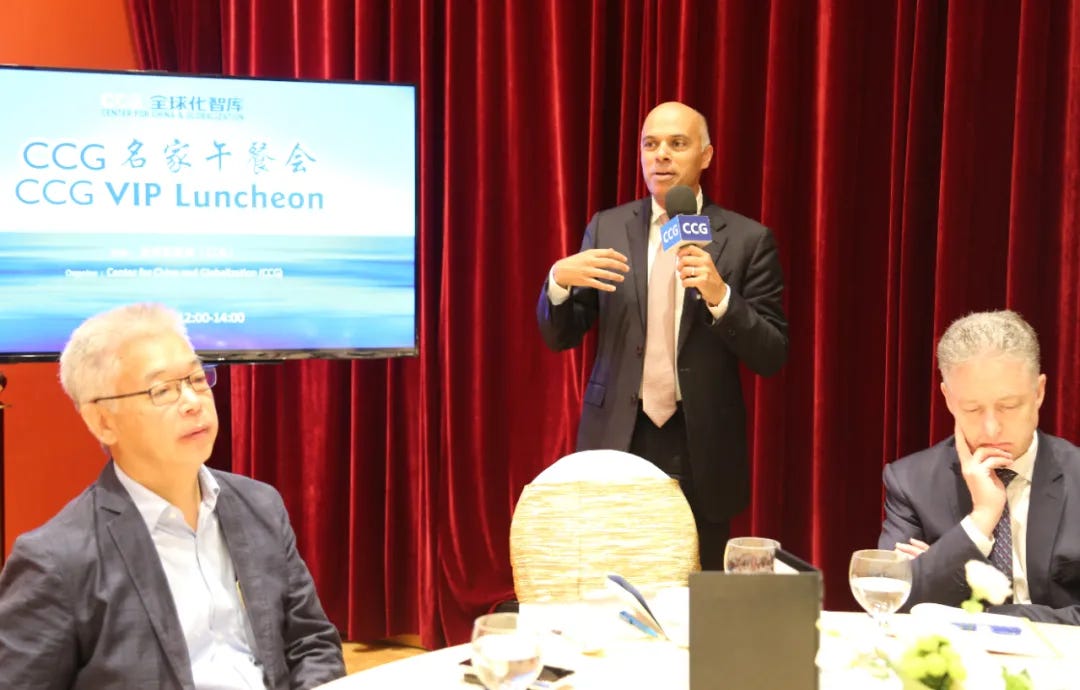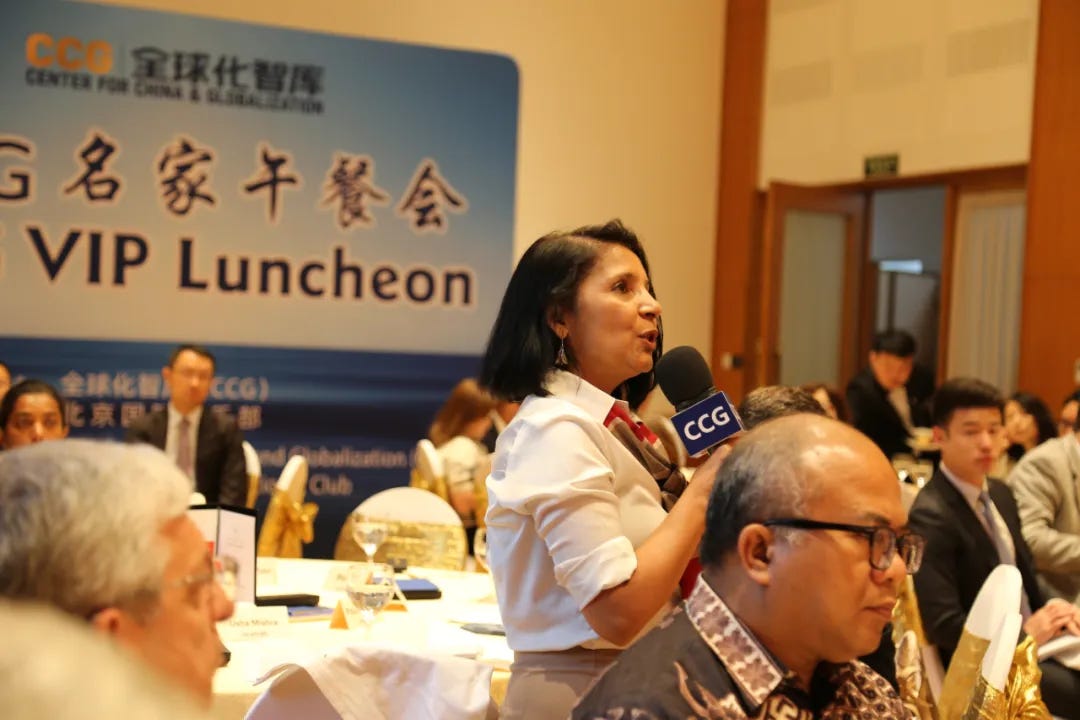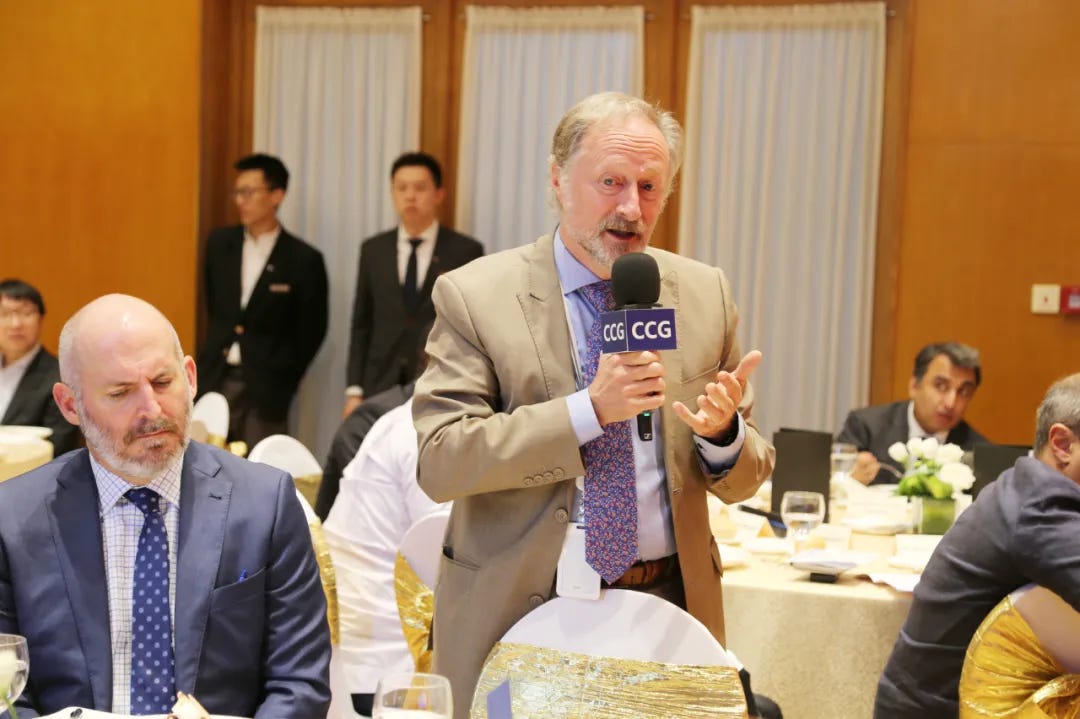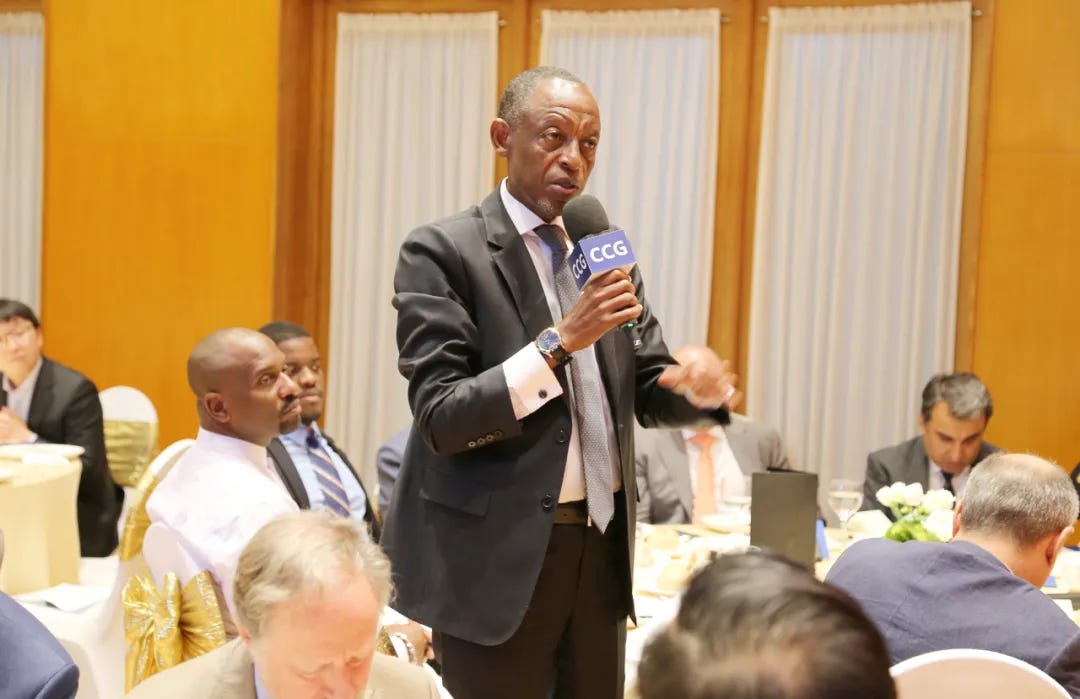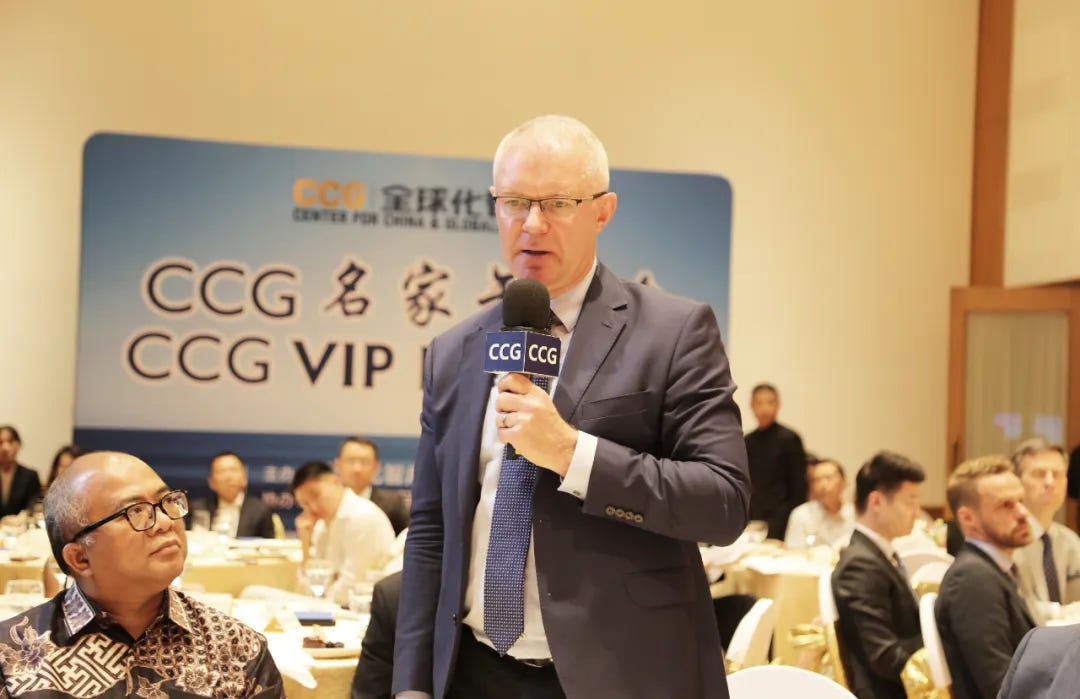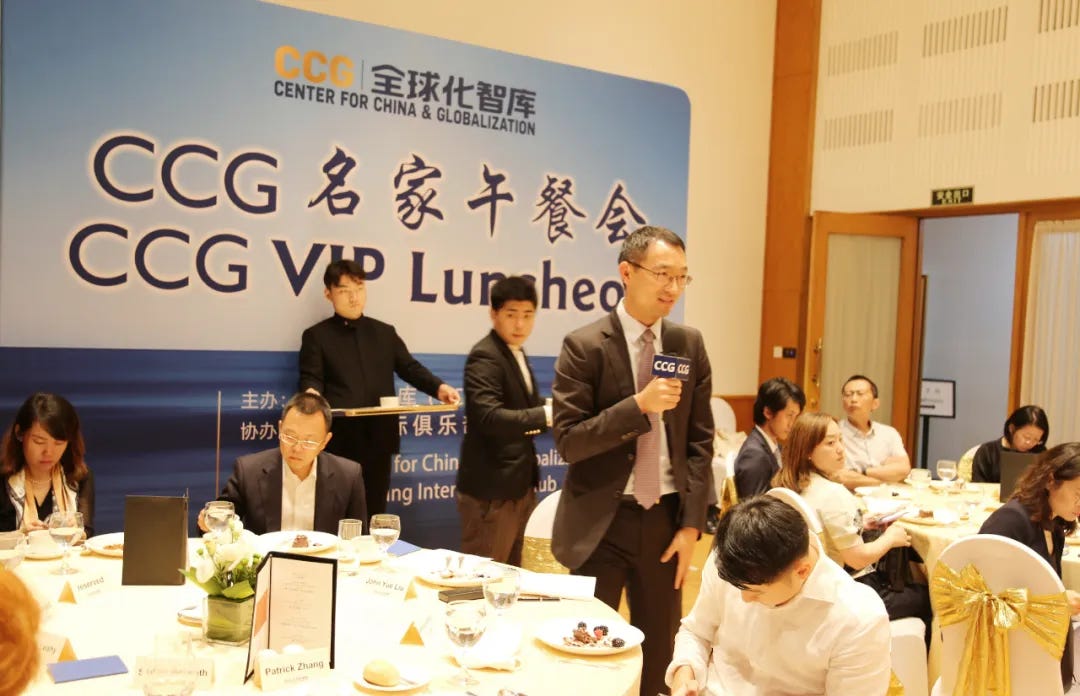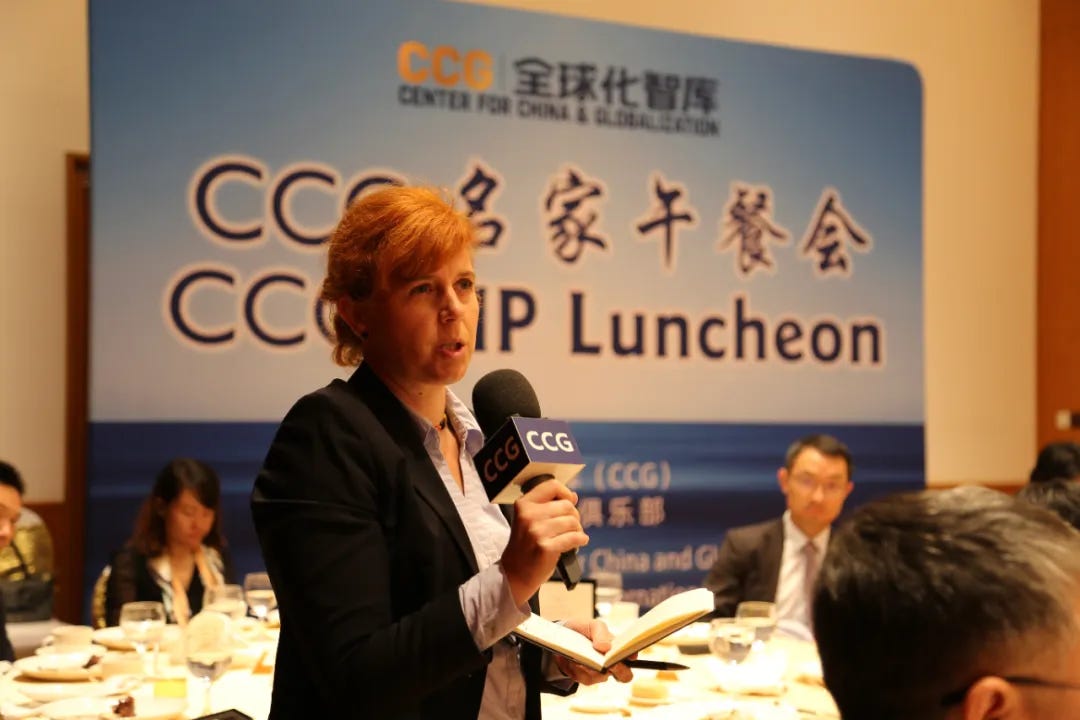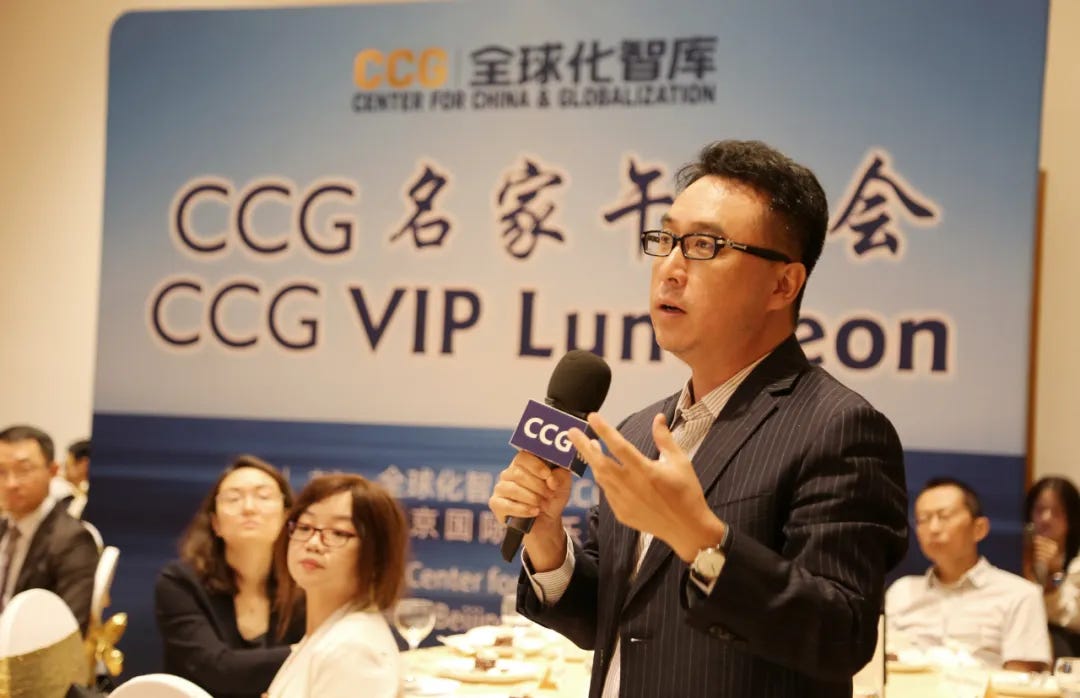Transcript: Huang Yiping & Tu Xinquan decode Third Plenum
CCG VIP luncheon invites Dean of the National School of Development & University of International Business and Economics
The Center for China and Globalization (CCG), supported by the Beijing International Club, held a third CCG VIP Luncheon this Wednesday, July 24. The luncheon was held in the historic Xianhe Hall of the club and featured Huang Yiping, Dean of the National School of Development at Peking University and Tu Xinquan, Dean of the China Institute for WTO Studies at the University of International Business and Economics.
CCG will broadcast the video recording of the event on Chinese online platforms on Friday and post it on the Chinese internet and YouTube afterwards.
The luncheon was moderated by Victor Gao, Vice President of CCG.
Guests from the embassies and international organizations attending the event include:
Bruno Angelet, Ambassador of Belgium to China
James Kimonyo, Ambassador of Rwanda to China
Hannes Hanso, Ambassador of Estonia to China
Thorir Ibsen, Ambassador of Iceland to China
Scott Dewar, Ambassador of Australia to China
Marcelo Suárez Salvia, Ambassador of Argentina to China
Hallam Henry, Ambassador of Barbados to China
Ian Marshall, Ambassador of Grenada to China
John Busuttil, Ambassador of Malta to China
İsmail Hakkı Musa, Ambassador of Türkiye to China
Yannick Mondy, Economic Counsellor, Embassy of Canada in China
Maja Frankovic, Counsellor, Embassy of Croatia in China
Dario Mihelin, Ambassador, Embassy of Croatia in China
Ole Grogro, Deputy Head of the Economic Section, Embassy of Germany in China
Devi Nandana, Second Secretary, Embassy of India in China
Parulian George Andreas Silalahi, Deputy Chief of Mission, Embassy of Indonesia in China
Derek Lambe, Economic Counsellor, Embassy of Ireland in China
Aramiro Tai Rākena, Trade and Economic Counsellor (Acting Deputy Head of Mission), Embassy of New Zealand in China
Bilal Mahmood Chaudhary, Deputy Head of Mission, Embassy of Pakistan in China
Estelle Vuichard, Deputy Head of the Economic, Finance and Trade Section, Embassy of Switzerland in China
Sabino Fornies Martinez, Counsellor, EU Delegation to China
Virgilio Bisio, Charge d'Affaires ad interim and Commercial Counsellor, U.S. Embassy in China
Colin Guest, Minister Counselor for Economic Affairs, U.S. Embassy in China
Paul Stempel, Acting Director of Economic Affairs, U.S. Embassy in China
Wen Li, Representative of the International Organization for Migration in China
Usha Mishra, Chief of Social Policy and Reform for China Section, UNICEF China
Chu Q. Wang, Diplomat & Partnership Specialist, UN Women
Guests from the international media include:
Sabine Gusbeth, China Correspondent, Handelsblatt
Joseph Leahy, Beijing Bureau Chief, Financial Times
John Liu, Managing Editor for the Greater China Region, Bloomberg News.
The event was also attended by senior executives of multinational corporations including:
Haixia Cui, Vice President of Government Affairs, IBM Greater China
Anna E, Director of Public Affairs, Mars China
Wenjie Gu, China Chief Representative, Zoom
Bo Huang, Managing Director, China International Capital Corporation
Junbao Shan, Chairman, China International Capital Corporation
Zhen Liu, Vice President of Kuaishou Technology
Amit Sevak, CEO, ETS
Mengyan Wang, Managing Director, ETS China
Rong Shang, Vice President of Communications and Corporate Affairs, Microsoft Asia-Pacific R&D Group
Anthony Wang, Founding Partner, Serafund
Xiaoming Wang, Vice President of Public Policy, Mastercard
Xu Wang, Executive Director of Sales, S&P Global
Qi Zhang, Senior Director, Nike
Qi Zhang, Director of Group Public and Regulatory Affairs, Standard Chartered Bank.
Huang Yiping, Dean of the National School of Development, Peking University
Thank you, Victor, for your very kind introduction. I cannot claim myself as an authority on national development. I do a little bit of work in finance, but microeconomy is also one of the issues we always pay attention to. So I'd just like to make a few points in relation to the Third Plenum, and then we can probably start from there.
The first point you probably all saw is that the Asian market dropped after the Third Plenum, especially after the full document was out. So some people felt a little bit pessimistic. My own sense, my take, is that the market was probably too optimistic about what they should expect.
In fact, if you were paying attention to what the President himself was saying and the message government officials were trying to convey to the public. It was pretty clear this would not be a grand-scale liberalization program. This will be about reform, about modernization. But the key approach, the President outlined himself very clearly. He called it running towards the problems and trying to correct them. So it's more like a down-to-earth and very practical approach—when you try to see the problems, you try to overcome them.
I personally obviously would have recommended more radical approaches if I had the chance, and I actually did on some occasions. But I think, realistically speaking, this is what you should expect from the Third Plenum:
No. 1, the Chinese reform approach was never really a radical approach or a "big bang" approach. In fact, as economists, we spend decades debating with each other whether the former Soviet Union's "big bang" approach was better, or the Chinese gradualism approach was better. Not to mention which is better, but just think: any kind of reform program you adopt needs to meet one requirement, that is social, economic, and political feasibility.
So I would say to expect that now China is suddenly turning to a very radical and big-bang approach, it might be at some stage, but this was, No. 1, not the traditional approach to Chinese reform. No. 2, even if you were thinking about turning to a more radical approach, this is probably not the best time. Given the domestic problems that we're facing—inequality problems, financial risks, and so on—you need to be careful when you liberalize. According to the policy document, there are lots of market failure problems in addition to government failure problems. So that's why you will want to be careful.
The second reason, and I'm sure you all know, is that geopolitical tensions certainly make it much more difficult when you liberalize. It doesn't mean you don't liberalize, but when you liberalize, you need to be careful.
I can share with you one of my own experiences that is related to the financial sector. In the National Financial Work Conference held in 2017, there was one particular article saying we're going to steadily push forward capital account liberalization. You all know, I'm sure, diplomats all understand capital account liberalization, right? That means capital can move in and out freely. That was a long-term goal. And that policy was specifically written in the policy document in the 2017 National Financial Work Conference.
The Central Financial Work Conference last year didn't mention capital account liberalization. It still said we're going to liberalize, open up, but it also mentioned the importance of national security issues in economic and financial areas. Therefore, it actually emphasized attracting foreign financial institutions to China and attracting long-term capital to China.
Why was there a shift? I think you probably would understand. When you open the capital account, the good thing is there is a chance that you can improve the efficiency of financial resource allocation, but it also brings the problem of very volatile capital outflow and inflow. Only if you have a strong financial system can you withstand the kind of dramatic capital inflow and outflow. Many developing countries, in fact, do not have the capability. So after they liberalize the capital account, you end up quickly with a financial crisis. That's what happened in many countries during the Asian financial crisis 25 years or so ago.
I was appointed by Christine Lagarde, then the Managing Director of IMF in 2018 as a Member of the External Advisory Group on Surveillance. I'm not sure if you've heard about Surveillance. IMF sends its people to member countries every year to review their economic and financial policy framework and then would make recommendations.
For one policy recommendation—they always recommend to developing countries that you should open up the capital account. I thought that was a wrong policy prescription. It really depends on whether you are ready or not. If you're not ready, you probably should not liberalize it.
So in fact, during my three years tenure as an external advisor to the IMF for the reviewing process, my most important recommendation was don't force developing countries to liberalize the capital account. In fact, if they are facing great financial risks or risks of financial crisis, you should encourage them to introduce some restrictions on the capital account and capital flows. So the IMF actually, to some extent, adopted that recommendation.
So what I'm saying is the reforms need to go forward, no question, but you only want to do it prudently. And I think the approach the government took, No. 1, was very much in line with what I actually expected; and No. 2, I thought that was a realistic approach. You know, if you have more aggressive ideas, as I said, personally, I would like to recommend some more aggressive measures, but perhaps this is not the best time for us to expect it. That's the first overall approach.
So when you say, well, the market is disappointed. That's probably true, but either because the expectation was just overly too high or No. 2, I think the reason why investors are not very upbeat at the moment is because the macroeconomy is not doing particularly well.
You saw the numbers. The GDP growth was 5.3% during the first quarter, and it came down to 4.7% during the second quarter. That was a problem. And I think what the government should do, and I hope they will do more, is to adopt a much more aggressive stimulus package to boost economic activity and boost the sentiment. So that's my first point.
The second point is, what were the key focus/emphasis in my view? I think we should look at when the President said we're running towards the problem and trying to correct it. The question is, what are the key problems we are facing? If you read the policy document, there are 300 policy items that are going to be implemented, so this is a very complicated story.
But as an economist, for me, what are the two most important economic challenges we're facing? I think there are two issues.
No. 1, how do we sustain economic growth? We used to do very well when our cost base was very low and we exported a lot of labor-intensive manufacturing products. And the growth was particularly strong. But the labor cost or the GDP per capita increased from about $200 when we started economic reform. And now we're at the doorstep of the threshold of a high-income economy. Income levels increased dramatically. The other side of the coin is that your cost base is also very high now. So you can't just repeat what you were doing in the past, you need to do new things to remain competitive and to sustain growth.
For us economists, the key indicator is what we call total factor productivity (TFP). You need to improve efficiency. How do we improve efficiency? The government said, well, they coined this new term called the "new quality productive force." What is it? I don't know exactly, but I think it's about some new scientific research and innovation-driven, new economic activities, business models, products, and so on. At the same time, if we can do better in the traditional industries, like industries, even agriculture, and so on, we use the term total factor productivity.
This is the key, but what is behind the rise in total factor productivity is innovation. Innovation could be like globally cutting-edge, frontier technology, but also could be just whatever we're doing, we do it better. Even if you're cutting somebody's hair, you can do it more efficiently and with high-quality products. That's better. That's also good.
So these are the things the government is trying to focus on. That's why there are a number of measures. They're trying to focus on what we can do to promote research and development. And there's a long (list of) items. How do we foster the growth of talent? That's another, including universities. That's a big job.
What is also important is I think there was a very clear or at least clear division of labor between the SOEs and private enterprises. This is one which I think is very important because for innovation, the private sector contributes something like more than 70% of the Chinese patents. So at the end of the day, the question about whether or not you can innovate really depends on whether the private sector can do the job.
What I saw was hopeful in the policy document was the government said they're going to grant all kinds of opportunities to the private sector, including equal entry standards, including giving the private enterprises the opportunity to participate and even lead key scientific research projects and a number of others. So I thought that was very good.
At the same time, the document also said that the SOEs, well, obviously they're going to become more important in the Chinese economy. I must say the foreign press focused on one specific term—the government said they're going to make the state sector bigger and stronger. But what I think was even more important was they said the state capital should concentrate on three key areas:
No. 1 is related to national security and the stability of the national economy.
No. 2 is more related to public utility, supporting the welfare, and stability of the economy and so on. This is more like public service.
And No. 3 is more on leading innovative areas like new technology and so on.
I'm not 100% confident that the state sector will do very well in terms of innovation, discovering new products. But I think in terms of maintaining the stability of the economy and providing public services like transportation, railways, buses, and so on, these are the ones the state capital should focus on. I think this is no different from any other market economies. That, I thought, was very good.
That clear division of labor, in fact, makes it clear what the SOEs should focus on going forward. And at the same time, it also identifies the areas where private enterprises can play bigger roles. So that was on innovation. I thought it was pretty clear.
The second issue, which is also a very important economic issue, is about consumption. Consumption is very low compared to the world average. The consumption share of GDP in China is 55%. So only a bit over half of the GDP was spent on consumption. That was 20 percentage points below the global average. And so we always say, well, consumption is very weak in China.
Weak consumption causes two problems. No. 1 is you obviously would easily end up with a domestic overcapacity problem, right? You produce a lot, you invest a lot, and then the final consumption demand is very weak. That means there will be a certain portion of the capacity you cannot find domestic buyers for, and you call it overcapacity. That's why during the last 45, 46 years of Chinese reform, we almost always had the overcapacity problem.
The NDRC has now stopped doing it, but before, every year, the NDRC would tell people, these are the areas you should try to avoid because there's an overcapacity risk. So for instance, labor-intensive manufacturing products, white goods, steel, cement, aluminum, and so on. There's a long list. And now we are talking about the new green energy products.
I think the macroeconomic problem is there is a macro imbalance. Consumption and demand and supply are not very balanced. So that's one big issue.
When China was small, you could actually export out of the problem. When we have overcapacity, we just export it, and then there's no big issue. Now it's becoming a big issue because you're already a large country economy. If you want to repeat the same strategy, there will be big problems going forwards.
In fact, before we started exporting lots of EVs to the U.S., I mean, we exported 1.2 million EV units to the global market. Last year we exported 10,000 EVs to the U.S. But when Secretary Janet Yellen visited our school in April, the first thing she said was your overcapacity in the EV sector is going to destroy our automobile industry and affect our employment situation.
Now that might be true in terms of the long-term expectations, if China continues massively, if the exports continue to grow massively. But when I said, well, China only exported 10,000 units of EVs to the U.S., do you really think that's having a big impact on the U.S. market and the industry? That's another issue, but what I'm saying is the reaction function of the world market is already very different. So that's why you need to be careful.
But the second question, which the policymakers also pay close attention to, is if consumption is weak, that means your development is not benefiting the ordinary people. You're saving lots of money; their living standard is not rising as quickly as it should be, right? And the reason why consumption is weak, there are many issues or hurdles. I can give you, for instance, four important reasons:
No. 1 is obviously, the income share of the household in total national income is still too low. In other words, the SOEs, the government is still capturing too much income.
And to give you one example, I mean, you've probably heard that one of the main revenue sources for the local government is selling land, right? That is one of the biggest distortions in the Chinese economy, that local government could sell land and get revenue and do whatever they could do. But that's not fair because the land doesn't belong to the local government. It should belong to all people in China. If somebody sells land, income should be distributed. But it was not. So that's just one example. And I think we need to redistribute income. Therefore, the households can capture more income. I'm going to stop very quickly.
The second reason is that income distribution is very unequal. So rich people have a very low propensity to consume, and poor people have a very high propensity to consume. But income distribution is so unequal. Therefore, you're going to see very weak aggregate demand.
The third reason is the underdeveloped social welfare system. So that's why people worry if a household gets income, they don't spend all the money. They put the money into the banks. That just means the social protection is not good enough.
And finally, urbanization. Migrant workers work in the cities for 10, 20, 30 years, they still don't get household registration. And so they don't enjoy the same kind of social welfare benefits. That's why their spending is constrained because they need to go back home to build their houses in the village and support their family back home. My guess is that I don't think they would ever live in that house in their own village. You have been living in the cities for 40 years. After retirement, are you really going to go back and live there? Because you would know nobody there.
So these are the things the government is now trying to resolve. Income distribution is one big issue. They're called the primary round of distribution, the secondary round of redistribution, and the third round of redistribution. In fact, one key area that policy focused on is to grant people, whoever is living in the cities with this long-term residency, should enjoy the same kind of social benefits.
There was a study by CASS, the Chinese Academy of Social Science. They found migrant workers who are living in the cities, if you tell them from today you will have the urban residence, even without enjoying the social benefits, his or her consumption spending increases by 36%. The reason is because their expectation is changed.
So these are the things I think the policy is trying to deal with. And personally, as I said, my take was the document itself, the overall content, was very much in line with my expectation. And No. 2, I think these measures were very practical and these are the problems we need to resolve.
But the market was not upbeat yet. I mentioned the macroeconomic condition, but the other challenge, which I cannot answer at the moment, is whether or not all these will be rigorously implemented. And that remains to be seen. Thank you very much.
Tu Xinquan, Professor and Dean of the China Institute for WTO Studies, University of International Business and Economic
Thanks for the invitation of CCG to let me have this opportunity to meet with all the friends from all over the world, actually. Professor Huang had a very wonderful explanation of the new Third Plenum decision. Actually, Professor Huang and I come from the same province, the most marketized and open province in China, Zhejiang Province. So I think CCG made the right choice: they invite us to explain the new reform agenda of China.
But as Professor Huang has talked a lot, I have only a few observations and understandings to add. My first general impression of the Decision is that it insists on and persists in the direction of monetization and liberalization of economic reform as shown in the last over four decades. So I appreciate its persistence and continuity very much.
There were some concerns and suspicions about that given the current internal and external circumstances. Some even said that the era of reform is over. Now the Decision has made it clear that reform and opening up is still what it meant before.
I don't think that China has another choice, actually, but to continue the path of market economy. The Chinese people have enjoyed the huge benefits of a freer economy and society and won't give them up.
Secondly, I notice an interesting change or important admission comparing this decision to that of 2013, the Third Plenum of the 18th Party Congress. In the 2013 decision, the basic economic system with public ownership playing a dominant role is considered an important pillar of the socialistic system with Chinese characteristics and the foundation of the socialist market economy. But in the new decision, the dominant role of public ownership is not mentioned for the first time, as I know, in those important party documents. This omission must be intentional and meaningful.
Another thing is also absent, which is mixed ownership. We know that mixed ownership was designed to enhance the cooperation between SOEs and private companies, but in practice, often turns out to be enhancing the way SOEs merge with private companies.
So in my opinion, the fundamental issue in the Chinese economic and even political reform is the ownership problem. If the government always emphasizes that the public ownership should take the dominance, the private sector, including foreign companies, won't be able to compete in a truly fair and equal way and the market economy mechanism won't be feasible. So I would say this intentional omission is a great step forward. Of course, I wish in the future or the planned law on the promotion of the private sector could have even more clarity about the equality between different ownerships.
The third important impression of mine is its emphasis on the unified national market. China is a huge and diverse country. The relationship, actually the struggle, between the central and local governments has been a permanent and difficult issue in the whole Chinese history.
I believe the market economy mechanism could be the best instrument to unify the country because the market economy, in nature, tends to expand beyond borders and integrate into a single one. So the law of one price. While local governments often want to create a fragmented and protected market, the central government could use a unified national market to break down the barriers. Given the increasingly unfriendly and hostile external environment, the unified large domestic market would be an even more important leverage against possible risks.
Besides, there have been a lot of disputes about China's industrial policy in which local governments actually play a very important role, which is also mentioned by Professor Huang about the so-called "overcapacity" issue. Local governments often take all available measures to compete with each other, not compete with the rest of the world, sometimes ignoring international rules and creating over-investment and over-production because the market is fragmented.
Therefore, the unified national market will also limit the discretion of local governments and promote fairer competition among market players, including foreign companies. The Decision explicitly declares to regulate the investment incentives of local governments and prohibits illegal preferential policies. I believe this will help to restrict unfair and excessive domestic and international competition.
The fourth keyword I would like to mention is "活力 Húo Lì", dynamism. To be honest, as an academic person, in the last almost decade, what I'm very unhappy with is there have been too many restrictions and control over the society and economy, including academic behavior. Even the government itself (is under) too much control, too many requirements, and too many restrictions. The government, too, is taking care of too many rights as well as responsibilities, leaving smaller space to the society.
The COVID-19 pandemic control made it even worse. Of course, in such a huge society as China, order and stability are very critical. But too much control kills social and economic dynamism. To some extent, it has harmed economic growth in China in the last decade.
Fortunately, I believe the leadership has noticed it. As I calculate, the word dynamism, "活力 Húo Lì", appears 5 times in the document. I think this is very special. I didn't notice it before. So I hope that the government could be more tolerant of certain deviations. It is too costly to eliminate all risks.
And fifthly, I will touch upon the part about opening up. Since the Decision is mainly about institutional reform, there are only a few paragraphs talking about opening up. But as usual, the Decision still presents a strong determination to promote further liberalization.
I also argue that while there is still space for more market access, China's opening up should be more focused on the coherence of domestic institutions with other countries, especially with those advanced countries, which is phrased as 制度型开放 institutional opening up, a very Chinese characteristic phrase in Chinese policy documents.
The Decision has a clearer description about what is institutional opening up or institutional openness by stating that China will pursue compatibility and integrability with international norms in areas such as property protection, industrial subsidies, environmental standards, labor protection, government procurement, electronic commerce, and financial services, which are those important issues often mentioned by the foreign companies and foreign governments. In recent years, the Chinese government also has been claiming repeatedly that we should follow the advanced international rules in these areas.
So I think China has shown its strong willingness to seek more commonalities with other market economies. Of course, we always have our own Chinese characteristics, but in terms of the economic system, I think we should seek more commonalities. So more mutual communications, like today's event, are needed to make it happen.
Here, I would also like to defend China in terms of WTO compliance. Actually, I just attended the 9th Trade Policy Review on China just a week ago in the WTO. Actually, most remarks made by members are positive. Only one single member has very negative comments on China's trade policy, which is the United States, as you all know.
I would not say that China has been perfect since China is the third largest respondent in the WTO dispute settlement mechanism. And also otherwise, if we are already perfect, we don't need to reform and open up anymore. But it is absolutely not China breaking down the rules-based international trading system. China at most is trying to make use of or dodging some WTO rules to its own benefits or to its own understanding.
But right now, the United States is really just regarding the WTO rules. So as I said, China is not perfect in its economic system and we need more reforms and openness. And everyone could criticize China for its certain policies and problems. But the United States should not pretend to be a defender of international rules while it is dismantling the whole international system.
In general, I'm very positive about the new Decision and the future of the Chinese economic reform. But as all you know, Chinese policy documents often tend to explain policy goals rather than policy tools. The Decision has told us where we should go, but not so clearly about how we can go there. So we still need to keep a close eye on what concrete measures will be made by relevant authorities to achieve those goals listed in the Decision.
So I think I'm gonna stop here.
Q&A
Amit Sevak, CEO of ETS
Okay. It's an honor for me to be here today. I'll stand up. It might be easier. I wanna just share very briefly that the conversation we just heard was a fantastic and inspiring reflection on the insights coming out of the Third Plenum. I had the opportunity to begin to try to, as an American, coming just after the Third Plenum. It's a very interesting time for interpreting and understanding: what do some of these reform agenda topics really mean? What do these three hundred particular policy areas actually mean? And how do U.S.-based organizations that are looking to invest in China, looking to expand in China, looking to serve...how do we interpret? And so the question I would love to ask Professor Huang is really, what is the perspective that you may have on how an American organization ought to interpret it? This might give us some insights and some thoughts to take back home.
Huang Yiping
I think the global environment has been changing. This is the basic conditions within which we should operate. As the Plenum reinforced the point that we are still open and very much welcome the foreign investors (and) firms, in fact, last year, I think NDRC or another entity issued a specific policy toward foreign investor firms. And I read it. I thought they were very good, in fact, the policy. But the sentiment or the confidence is still not particularly high. And I suspect that there are two issues we should keep in mind. And I honestly think the government wants to welcome foreign companies to come to China because as I said, in order to continue to grow, we face lots of challenges, including the productivity growth. That's one very big issue.
So there are two issues I think we need to keep in mind. Number one is, as the economy moves into the high level of development, the policy is probably becoming more selective in terms of what kind of industries and companies are more welcome here. At one stage, for instance, there were lots of heavy industry investors. Those days are already over. And I think it will be very important to recognize whatever can support 1) the new quality productive force will still be very much welcomed, and 2) whatever can help to lift the living standard of the people, these would also be very welcome. So there is kind of a selection of the industries.
The second issue is about national security concern. Now, like the U.S., which has small yards and high fences, I think you see the same stories here in terms of, for instance, data, information. I do see there are some changes over time. So it is becoming a little bit more tricky. But I guess the most important point to recognize is that the growth model is very different now and you need to be more selective.
Amit Sevak
Just ask a follow-up question. In the 300 policy areas, I had the opportunity to converse with some of the U.S. companies that are part of the US-China Business Council delegation, companies from Boeing, Apple, FedEx, Micron, and others.
And there were three areas where I'd love to maybe ask a follow-up about your specific views on. One is this consistent message around treating foreign companies and domestic companies, including SOEs on an even playing field. The second is around encouraging R&D in China. And the third is on the commitment to reduce the negative list items from 100 sectors to 30 or so on. These are three particular ones that many of the foreign companies and organizations that are interpreting the results of the Third Plenum are particularly focused on because those are the key ones.
You have closed your remarks by saying that strategy and implementation can often have a gap. In your view, if I may ask just this follow-up question, how in those particular areas do you see, how would an American or, for that matter, since there are many ambassadors and representatives here, how would global investors interpret those areas that suggest an openness, but any sense of how we think about the likelihood of those being a key part of the next few years implementation?
Huang Yiping
My sense is that (if) they put it down on an official policy document, then that certainly means they're serious. And I think they also recognize the continued Chinese economic growth really requires active participation of foreign-invested companies in China. Nobody, even a country like China can do the job all on its own. And I think that is very widely recognized.
But then when you say, well, for instance, the national treatment, the negative list, and so on, I expect that there will be some progress as we're going forward. But, 1) as I mentioned, whether or not that involves national security or other concerns, if there is a concern, then we should be very careful about over-expectation. 2) I mean, this is a closed-door dialogue, right? So I can tell you when we hear about national treatment and equal treatment for private enterprises and state-owned enterprises, I think the policy is clear. Should we expect 100% equal treatment of private enterprises and state-owned enterprises? I think we should be realistic enough. When a government official sees a state-owned enterprise and a private-owned enterprise, they won't be 100% equal. That's something we should just be very clear.
But this is why I also thought, as I mentioned earlier, identifying some key areas where the SOEs should concentrate their efforts, actually, is a very big help. You see, private enterprises are actually gaining more areas to operate, and these are the areas where they're going to see less discrimination.
Just to give you one example. You've probably heard the private enterprises are having difficulties in getting financial support. So I spoke to lots of government officials and the banks. The banks, in fact, told me that they don't discriminate against the private-owned enterprises. And so I said, why you're not lending as much to the private-owned enterprise? The bank executive said, well, I have to do credit risk management. If I lend 1 million yuan to an SOE and to a private-owned enterprise. Guess what? If the money to the SOE, like the project, failed, what you should expect is somebody in the government will support the SOE and merger acquisition, injecting assets, and so on. Chances are that they will repay the loan later. If you lend 1 million to a private-owned company and if it failed, you just will lose the money.
So just to give you an example. I think the policy is serious and we should expect making some progress. But to think that the treatment will be 100% equal, it will take time. I'm not saying the policies are not serious, but there will be areas where the implementation will take some time.
Usha Mishra, Chief of Social Policy and Reform for China Section, UNICEF China
I was very heartened, I would say, to hear about three things in your speech, inequality, the issues facing migrant workers or labor, and third, most importantly, social protection. So just a comment first on the migrants. If they get, for example, the hukou residence permit, expectations will go up and the consumption will go up. But they're also facing a number of other challenges. For example, they don't have the right housing. They're not able to live with their family together. So many more; it's multilayered.
On social protection, I've got a question: what do you think is the next frontier for social welfare or social protection for China? Where do you think the gaps are in terms of prioritization? And one final comment, I didn't hear much about demographic shift, which is one of the key challenges that China faces right now.
Huang Yiping
I'm not an expert on the social welfare system, so I don't exactly know where they're going to start. But the idea is that if you're living in the cities for some time, you kind of get what you'd call the 常住户口 Changzhu Hukou. It's a little bit like the permanent residence in some countries, but you do not yet have the citizenship. The policy is now that permanent residents should enjoy the same kind of social welfare protection. Because you mentioned housing, which, I don't know, to be honest, because even people with household registration may not have free housing anymore, so you have to buy or rent yourself. But the social welfare system is more about your kids' rights to schooling in the cities, medical care, pensions, and so on. These are the ones they're going to rule out going forward.
Demographics is a very important point. I think this is the biggest challenge we are facing. However, I think there are two issues. One is about the shortage of labor supply because aging means there'll be a decline of labor force, like what happened in Japan. I actually think it's relatively easier for China to deal with the problem. Did you stay like in hotels where they use simple robots to deliver the stuff to you? That is happening in many places. So I think robots and AI actually offer an opportunity for China to mitigate the labor supply problem. But on elderly care, medical care, social protection, and so on, these challenges will continue to be very difficult.
Bruno Angelet, Ambassador of Belgium to China
Thank you very much to CCG for another occasion. And this is a nice division of labor between Professor One and Professor Two, because Professor Huang means the first one, and Professor Tu means the second one.
So for Professor One/Huang, thank you very much for so candidly describing the context to perceptions and your analysis. On perception, I think what strikes me was that everyone was focusing on the communique which was available at the end of the week, and that made headlines. And people focused less on the Resolution that came out during the weekend. There is a difference between communique and Resolution for sure.
And I think it's very good also that we ask ourselves the question: what is actually new? And what are the points that are not highlighted by the observers, the experts? And you did very well. First, you said there is an issue of overcapacity; it's always been there. But as long as China was not the global power, the issue of overcapacity was not a global problem. And now it is a global report because China is leading in the global economy. And then you said overcapacity causes a problem of consumption. That is very interesting. You go into different regions. So it's very useful that you explained that.
And as the lady just said, you said social security and, of course, demography. And then you said the hukou. It strikes me that no one has focused on the language in the Resolution on the hukou because there is a little sentence saying the state will suppress, reduce, or take away restrictions on Chinese citizens working in a place elsewhere than their residence. So that's typically the hukou system. I was asking a few experts, but that sounds really great.
But then I was told it's been in many texts before. And actually, there is already a change in the hukou system because if you go into first-tier cities in the suburbs of Shanghai, Chongqing, even Chengdu, you hear that actually a lot of things are possible now. The hukou, in fact, is not really there anymore because they can buy houses, apparently; social security is less evident; but the schooling system is an issue because either you have your kids or you don't have your kids. If you have your kids, they don't go in premium schools.
So the question is here, what is actually new about the hukou? Because I'm told there's nothing really new because it was previously in instructions and documents and on the other hand, is being tested everywhere.
And then the second little question is about the retirement age because you said social security. Retirement age is one and it's related to demography. So what does the Resolution say? The Resolution says we will increase gradually the retirement age on a voluntary basis. So everyone is wondering: what does it actually mean? And it makes a lot of sense that the leadership is cautious because this is very sensitive. It's sensitive in Belgium. The government decided that I will retire not at 65, but at 67. We did it in Belgium, by the way, not a lot of questions asked. I understand it's very sensitive, but the question is, what will actually happen on retirement age?
And the third one is for Professor Tu, because you said, yes, there's language on unifying the market; and yes, it's surprising to see the impediments that there are to a full-fledged single market in China. But I'm also told that this language has been taken already and this objective has been put in many strategic documents before. So my question is what's actually new? Sorry to tease you a little bit for the sake of discussion.
Huang Yiping
Okay, let me try first your question about the hukou and social welfare benefit. The first point I want to say is that even the Resolution, which is much more in detail, is still a policy document. And now the 300 items are distributed to different government departments. They're forming working groups and putting together the concrete measures. We probably have to wait for a little while.
So we don't exactly know yet, but I can tell you my speculation. Why this time is different? The hukou system started to become a bit more flexible during the last few years. But the main constraint really was the local government budget because if you want to settle down a migrant worker, you need to offer them the kind of social welfare benefit and the local government needs to foot the bill. That's why it was difficult in some areas where the local government really had very tight budget.
My guess is that the central government is going to play some role in this area. What specifically, I don't know yet, like what kind of portion or what specific items. But the overall idea about the fiscal reform, the government has already said, they're going to centralize some of the spending responsibilities and they're going to centrally manage whatever fundraising that was conducted as long as they are supported by administrative power, local government, credit, and so on. They need to manage and integrate the budget, which probably means the central government will need to play a greater role. That's the idea. And I think it is different.
On retirement age, I don't know exactly, but the speculation is that we're probably going to postpone the retirement age like every three or five years. So for instance, at the moment, if this is 60, in three years it could be 61 or 62. That's the idea. I think there is already a consensus, I mean, (among) experts and policymakers. But you're right, there was no specific number in the document.
James Kimonyo, Ambassador of Rwanda to China
Thank you very much, Professor Tu and Professor Hang, for wonderful presentations. As an African diplomat, I just want to hear from you both. As you know, in the next few weeks, we would be having the next Forum on China-Africa Cooperation (FOCAC) where heads of state from Africa will be meeting their counterpart—of course, it's President Xi—to discuss strategic partnerships in different areas.
And I want to know the current reforms that have been talked about, where do you see Africa benefiting from the current reforms? Because as you know, many experts have talked about three paradoxes in Africa, the energy paradox, despite the fact that we have huge potential—more than 10 million megawatts of solar potential; we have 50,000 gigawatts of hydro and we have resources for new energy vehicles. And the industrialization is still at the lowest stage.
For us, we are not presenting ourselves in any market as people who want to be supported but as a continent that has a huge market of 1.3 billion people, the continent that possesses everything. If you talk about food security, for instance, 60% of the world's arable land is found in the African continent, yet many countries are facing food shortages. But I think the solution should not be buying food products or cultural products from Africa, but investing in agriculture to increase productivity, as we mentioned earlier.
So where do you find Africa and how does Africa benefit from the current reforms? Take into account the fact that this is, this can be win-win cooperation that will impact on the growth of the Chinese economy, but also support Africa's growth, especially the fact that for the first time in the history of Africa, we have become one market. And in January 2021, the African continent signed to be one market and the African Continental Free Trade Area. This is a huge potential for Chinese companies and enterprises.
So I wanted to see whether these reforms are also intent because I remember a few years back, I think three years, we talked about the dual circulation strategy. What is the current status of the strategy and how does it affect the growth of the African continent in general?
Huang Yiping
This is a very important question, but it goes way beyond my expertise. Maybe Professor Tu would be in a better position to explain to you what the government has in mind. I will give you two points and then I will step down.
The first is this is, China has this Belt and Road initiative. It has been doing quite a lot. There are successful stories and less successful stories. What I think the government is also emphasizing is in addition to providing funding to support infrastructure and so on, there is a big effort also to provide knowledge. For instance, in fact, our school, the National School of Development, has a parallel school is called the Institute of South-South Cooperation and Development. Every year we have dozens of students coming from developing countries, including lots of African students. In fact, the first PhD student I supervised was the Director-General of the office of the Vice President in Zimbabwe. So we are trying to provide some exchange and education to students from there. That, I think you could regard as the second phase of collaboration, not just providing financial support.
The second point, which I'll share with you, is my very wild imagination. Recently when we were talking about the domestic overcapacity of the EVs, the new batteries, the solar panels, and so on, at some stage, I proposed the idea of the so-called Global South Green Development Plan. It's a little bit like a green Marshall Plan. I think China has a domestic overcapacity problem in some areas. And obviously, the main export destination should be the advanced economies. But these economies are creating barriers for our exports. My sense is it will be very difficult for the domestic market to absorb all these capacity unless you just distract some of the capacities. But I think developing countries also require these products for their own green transition. And my suggestion is maybe the government can put together a new grand plan, like the Marshall Plan to support the green transition in developing countries. Hopefully, it will support their green transition, but at the same time, not only to raise the demand for Chinese production but also mitigate the overcapacity problem. This is a little bit of wild, but just to share it with you. Thank you very much.
Hannes Hanso, Ambassador of Estonia to China
Thank you very much for this opportunity. Thank you, CCG, for hosting this wonderful event. In your presentation, Professor, you focused on several important aspects of development and also the restrictions. And you mentioned control. There are too much controls, too many restrictions in different spheres, from economic regulation to academy, and so on and so forth.
How do you see this developing? You indicated in the document, this issue 活力 Húo Lì has been mentioned a number of times. Which restrictions, in which areas, and in which way, in your view, are going to be lifted or abolished? Also, what impact does it have on a wider sort of dynamic in this society and in this country? Thank you.
Tu Xinquan
Thank you. You know, in recent Trade Policy Review on China, there are always more than 2,000 questions raised by members. I hope there will be so many questions to me. Your question is also very difficult. Actually, as I said, there are some restrictions or control over the society, and also there are some complaints actually from us professors and academia persons. For example, after 2013, they had some restrictions about our overseas visits. So even for professors, we also have a kind of regulation like only five days for one country, and eight days for two countries, something like that. So there were some complaints.
But after a few years, this restriction has been canceled because, as I said, there were a lot of complaints and we find that this is not good for China, especially to expand our international influence or international exposure. Because, as I said, professors are facing restrictions to go overseas to communicate with other countries, with other also academia communities.
So then, gradually, this problem has been raised to be reflected to the relevant authorities where they may find this problem. So their restriction has been cancelled. And also in other areas, as a professor, we also faced a lot of financial restrictions to use our research fund. There were a lot of restrictions. Actually, it was very difficult for us to use our own research fund. But also after a while, the government noticed it. So under the direct leadership of former premier Li Keqiang, new regulations were adopted.
Now it is much easier for us. So I mean, of course, there would be problems emerging. Then after a while, we will find a solution to deal with the problem. So actually, as I said, there have been some restrictions which have been found inappropriate and bad for us. So the government will take new measures to deal with it. Of course, right now there are still some restrictions. During the pandemic, universities established some entrance registration requirements. Right now, some universities are still using it. So if you are going to enter our campus, you need to register in advance and scan some cards or whatever.
So I think this (is) kind of continuity, from the older, the past restrictions. As I said, I think we need more resolutions to deal with those restrictions. Again, for the government, of course, stability or security is very important priority, but you need to strike a balance. I think we need to deal with those problems one by one. Maybe some will be more difficult, but some will be easier to deal with.
Thorir Ibsen, Ambassador of Iceland to China
Thank you very much. I want to join in thanking CCG for its excellent presentations of the two speakers. They are very good and very clear, especially of the conclusions of the Third Plenum. (It's) difficult, evidently, for us to digest the whole document, and you should have this.
One of the emphases of the Chinese leadership has been on speaking to importation and making it clear to importers to China that China is open for its importation of foreign goods. And there's an interest in the leadership to facilitate that importation even further. I'm wondering whether that is being addressed in any of these 300 reform points? More specifically, one and a half years ago, China introduced a new registration system for importation of goods that has proven to be extremely difficult for exporters because of complexities, and bureaucratic confusions. Is there any attempt in the calculation of these 300 proposals to address these issues? Thank you so much.
Tu Xinquan
Thank you, ambassador. I didn't know about the registration requirement you mentioned. But basically, I think, as I also mentioned, in the last years, China has been working hard to promote unilateral liberalization. You know, the current average tariff is already below China's commitment to the WTO. It's like almost 7%. It is below the 10% Chinese WTO commitment. And also in terms of trade facilitation, we also have reduced very much clearing hours at the border, at the customs. So basically, I would say China has made a lot of progress in terms of trade liberalization and facilitation.
But of course, also as you mentioned, maybe the more important issue is not border measures, but some regulatory measures. So we consider it as the so-called, as I said, institutional openness. In my opinion, China should learn more from the advanced countries in terms of their better practices (and) in terms of their regulations in a number of areas (like) labor protection, and environmental protection. The registration requirement mentioned by you is maybe about the SPS (Agreement on the Application of Sanitary and Phytosanitary Measures) or TBT (Technical Barriers to Trade Agreement). That's also actually about regulatory coherence.
The WTO, of course, has already two agreements on those technical requirements. Of course, if you really have a very significant problem, as I said, the WTO already has provided a platform to discuss those issues.
So again, as I said, sometimes there will be some conflicting policy purposes. For some government agencies, they will have their own priority, but sometimes it will conflict with other purposes of other government agencies. Like MOFCOM will promote trade liberalization and facilitation and other agencies will have their own priority, and maybe the State-owned Assets Supervision and Administration Commission of the State Council (SASAC) or other agencies will have their own priority. Sometimes they will be in conflict with each other. So we need more internal policy coordination. Actually, the document also mentioned (that), especially in macroeconomic policies, we sometimes need, as I said, policy coherence between different policies. So we need more coordination in this sense.
John Liu, Managing Editor for the Greater China Region, Bloomberg News
Thank you. Professor Tu, you mentioned the omission of the dominant role of public ownership. So if public ownership or state-owned enterprises are not going to have a dominant role, what role do you see them play in the economy? I would love to hear from you.
Tu Xinquan
Thank you. As you know, China is a socialist country and a socialist market economy. So basically, we believe that public ownership is a critical feature of this system. So, as I said, this kind of "omission" is very meaningful.
But then you mention what role should SOEs or public ownership should play? I very much agree with Professor Huang about the role of SOEs in the Chinese economy. I believe SOEs as the state sector should and could play a very important role, especially in providing public utilities and also social and economic stability. I think also this is actually one advantage of China's economic system because SOEs are controlled by the government and the government could use it for many social purposes.
Also, as mentioned by Professor Huang, there's also a very significant problem of inequality in China. The public sector or the state sector right now is already playing a very important role in this sense, like right now, hospitals in China are mainly public-owned. I think Chinese hospital system has provided at least affordable and, maybe not so perfect, but a good health service to the general public. As I said, I come from Zhejiang Province, also from a small village. Now my parents can enjoy the public health system. Even for the relatively poor people, they can enjoy relatively good health services. If the health system is also private, I would say the cost will be much higher. So I still believe that the state sector could play a very positive role in providing those public goods.
Sabine Gusbeth, China Correspondent, Handelsblatt
Hi, my name is Sabine Gusbeth. I'm from the German business daily Handelsblatt 德国商报.
One of the biggest issues of the Chinese economy is the real estate crisis, which also holds back household consumption. Do you think that this problem is sufficiently addressed in the Resolution and with the urgency needed? The second question would be, there is new year mentioned in Resolution -- 2029, which I don't think has been around before until when the measures should be implemented. And do you think this creates a new urgency? Or how can we interpret this year?
Tu Xinquan
Thank you for your question, but I'm sorry, I'm not really an expert on this issue. Of course, as you mentioned, the housing market is critical for the Chinese economy. Actually, the current difficulties in the real estate market are partly due to some excessive policy interventions. The intention of the government is to actually transfer the resources in the real estate industry to other more productive industries, especially manufacturing industries. So I think the purpose or intention is right.
But the problem is, in China especially, and also as mentioned by Professor Huang, we have a low share of consumption. Chinese people's consumption is largely related to houses or apartments. Chinese people are very good at saving, not good at consuming, but we would like to spend money on the house. But when the housing market declines, then our consumption also declines.
So in my opinion, we didn't expect the impact of the decline of the housing market on consumption. I think it is really urgent to deal with this crisis. But I'm not sure whether this document has provided a clear solution to that because the housing market is still declining. It will take a while, I think. For now, the government has taken a number of measures to try to stop the decline, but it's not so easy. Thank you.
Qi Zhang, Senior Director, Nike
Thank you, Professor Tu. I know you are an expert on the trade policy of WTO. So my question is about that. The document of the Third Plenum mentioned China will take institutional opening up and will change the rules of subsidy, IPR Protection, environmental protection and subsidies, labor protection, etc. So does it mean China will follow the rules of CPTPP? And could you give an update on China's accession negotiation to CPTPP? Do you really think China will rewrite the domestic rules to follow the standards of CPTPP? You know, CPTPP has much higher international rules.
Tu Xinquan
This belongs to my expertise. Thank you. China has applied to join the CPTPP, but for now, as I know, there's very little progress. It's very difficult for China to join it because there are different understandings about this issue among the existing members, and also there are some political difficulties. So for now, I would say at least it is not possible for China to join it now. But actually, in recent years, many local governments have tried hard to take CPTPP rules as the benchmark for their own reform and opening up. So in this sense, I think that China does not need to join the CPTPP to do as CPTPP requires. So we can do it ourselves.
Basically, CPTPP rules are about, as I said, institutional reforms, not about markets. Of course, there are some, but not so much about market access. So you can do it unilaterally all by yourself. So, as I mentioned, the Resolution has listed those areas where we can promote by ourselves, and many of them are related to CPTPP rules. Not all of them, but some of them. So in this sense, I think Chinese institutional opening up could go beyond CPTPP rules. We should follow the best practices of other countries, not only international rules but also other countries' best practices. So we should learn from others to make ourselves even better. Thank you.







